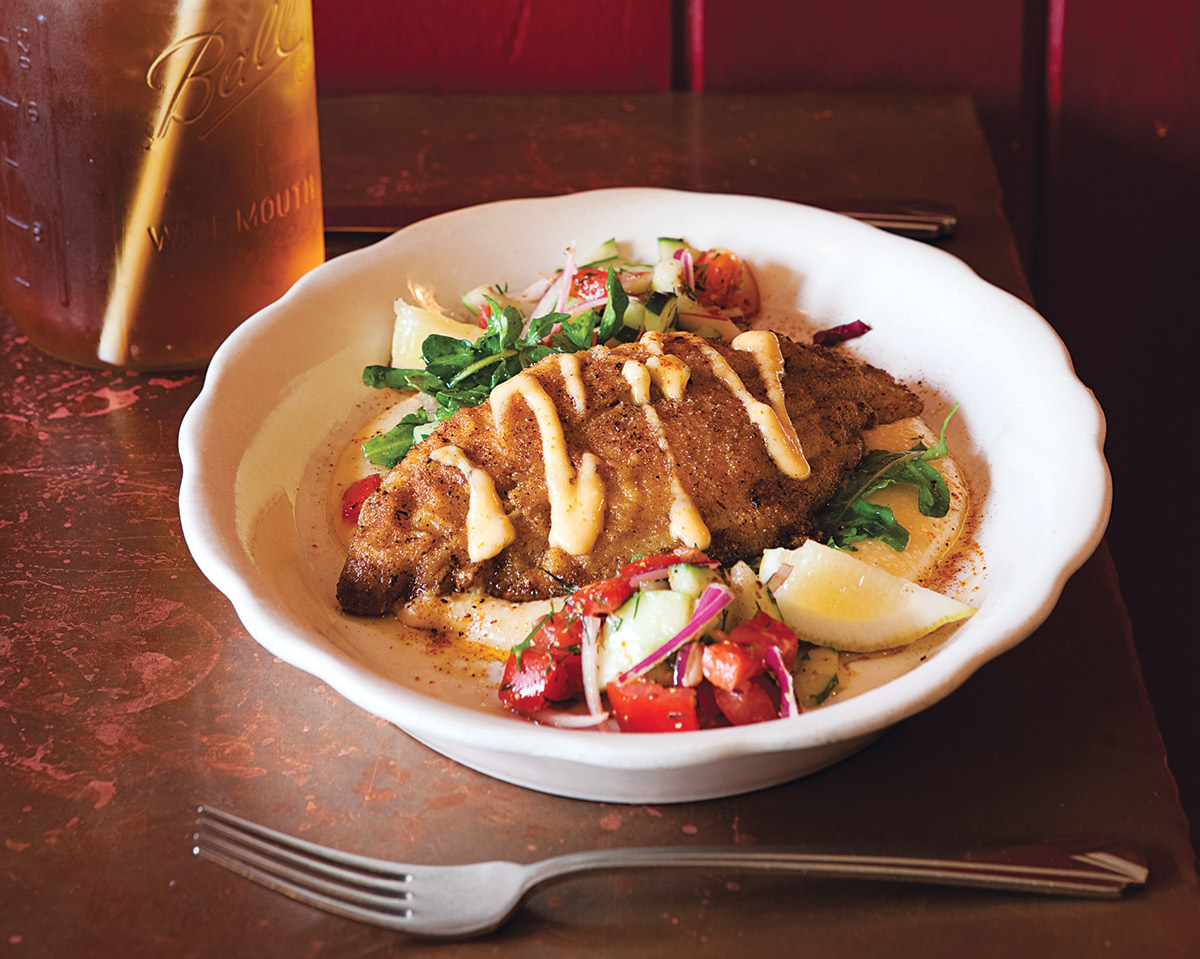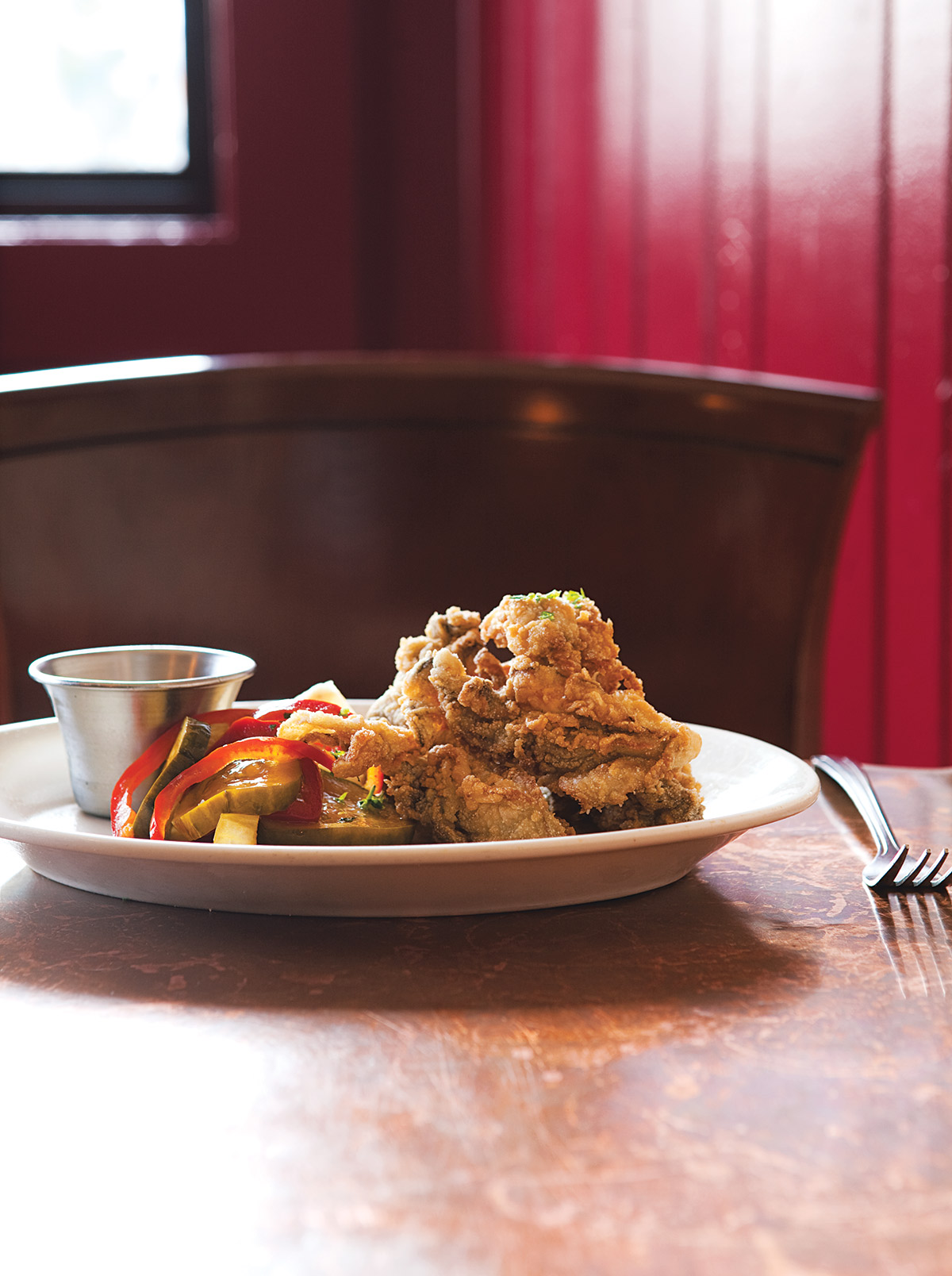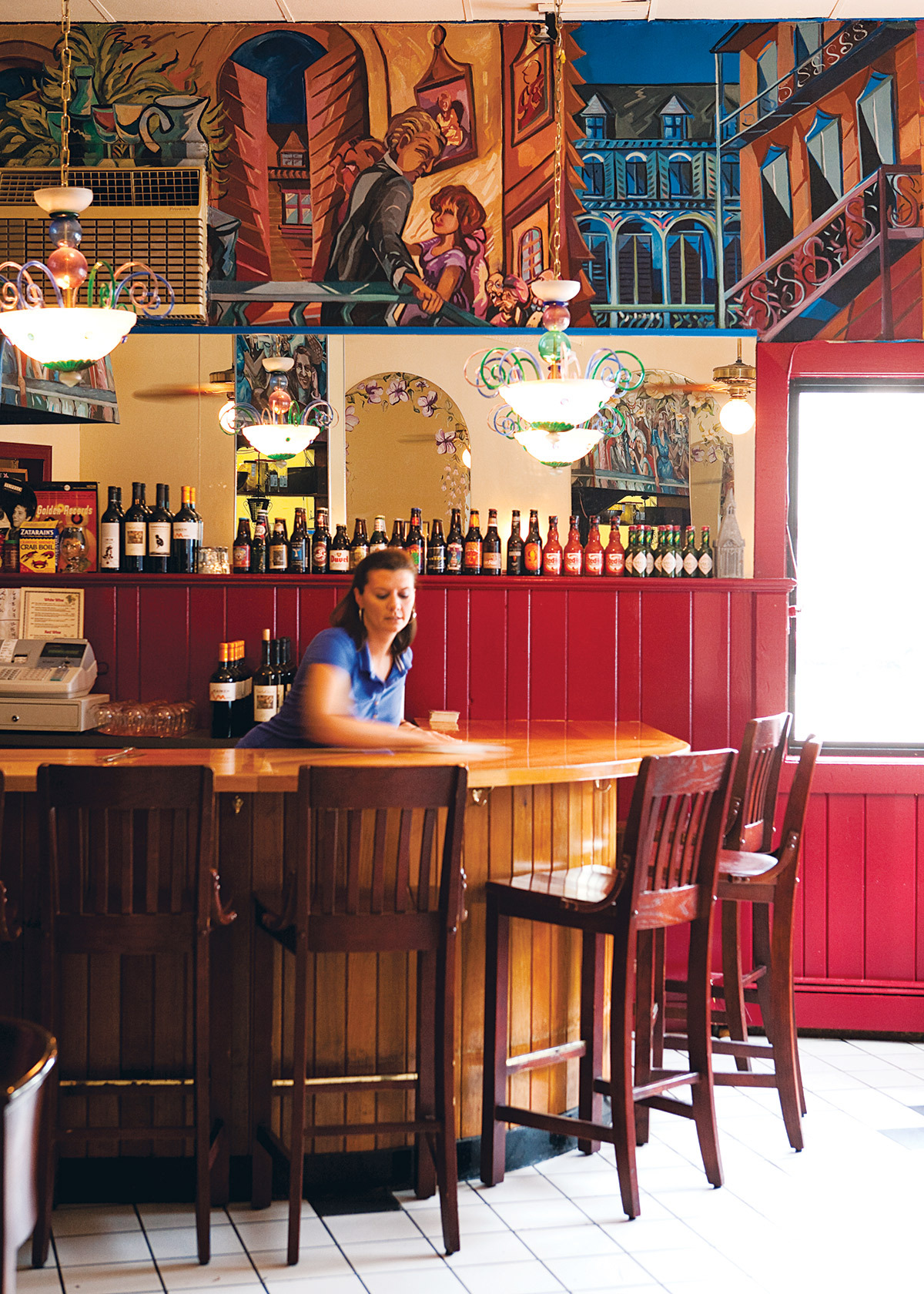Dining Out: Tupelo

Photograph by Keller+Keller
Rembs Layman sounds like the kind of chef who can kick things up a notch whenever he feels like it. Over the phone, at least, he has the brash, winning personality of Emeril, as well as a similar family background: half New Orleans, half New England. Layman’s been here all along, though, much of the time with the equally affable and outgoing Paul O’Connell of Cambridge’s Chez Henri and East Coast Grill, the southern-themed Inman Square anchor.
And now Layman is the chef of Tupelo, a New Orleans–inspired joint down the street from East Coast Grill owned by another local force: Renee “Petsi” McLeod, co-owner (with husband Mike Walker) of Petsi Pies, who won my heart with her unpretentious southern-style cooking. Both Petsi Pies locations have the sort of earnest authenticity that the best of their Cambridge and Somerville neighborhoods share, which is probably why they caught on so fast. Tupelo has it, too, plus a livelier vibe and down-home food that’s sloppy and fun when it’s at its best.
The food here has a big-hearted appeal that makes up for its flaws and sometimes imprecise or muddled flavors. But then, that describes a lot of New Orleans fare, even if some of my NOLA friends will rise up at my saying so—and even if Layman, who told me that he didn’t want to be boxed in by just one cuisine, is making food that is by no means restricted to that city’s influence.
The dishes that most impressed me at Tupelo, though, are strongly associated with New Orleans: fried oysters, fried catfish, and gumbo (which even gets the name “New Orleans gumbo”). And the red beans and rice, maybe best of all, is a recipe straight from Layman’s New Orleanian mother.
There are vegetables—both pickled and fresh—on the menu, part of Layman’s effort to go beyond a cuisine that doesn’t often feature them. A baby spinach and apple salad with a slightly spicy “Creole vinaigrette” ($5) provided bright contrast to the entrées and tasted really fresh. The “braised hearty greens” ($5) had the same vinegary tang as the crunchy pickles of various vegetables that show up in several dishes.
But this isn’t the delicate, low country–influenced fare of Hungry Mother, another Cambridge newcomer. Breading and frying rule at Tupelo, and so do the hand-whisked rémoulade and its spiced variations. I liked Layman’s fried oysters ($8) better than numerous versions I’ve had in New Orleans, because he uses plump Washington state oysters and not the fat Gulf variety I find off-puttingly huge and flaccid. And he keeps the dredge simple: half flour, half semolina, which gave the oysters great bite. Homemade green pickles gave even stronger bite, and the habanero-spiked mayo, which Layman says he makes every day, gave spice.

Photograph by Keller + Keller
If you want to start with something even richer, order the deviled crab salad with garlic toast ($7), heavy on the mayo, just as in New Orleans. The other hearty starter that I liked was the spiced turkey meatballs ($6) with, as the menu says, “French bread for mopping up.” Despite their large size, the meatballs were light-textured—if long on the kinds of dried spices (garlic powder, chili flakes) you taste after you go home. What got me, though, was the spiced chicken stock the meatballs steep in, which was well worth mopping up. The spongy, anti-artisanal baguette that Layman himself buys at a Portuguese bakery down Cambridge Street is close to what you’d get in New Orleans (soft, mild, un-crusty) and works perfectly as a sop.
The main course I couldn’t get enough of was the gumbo ($9). This wasn’t the most extravagant or best gumbo I’ve had—I order it where I see it, and have had several versions in its home city—but compared with the surf-‘n’-turf gallimaufry that many chefs make, it was admirably restrained, with andouille sausage and pulled chicken. And it was definitely soupy, thickened with okra and oil-based roux (oil being all the Cajuns could afford, Layman pointed out; Creoles make their roux with butter) and flavored with lots of garlic, Worcestershire, and Tabasco. One bowl was plenty, though I wanted more.
I did keep ordering bowls of red beans and rice ($5), which had more garlic and Tabasco, as well as a paste-like heft that’s gone out of fashion but here reminds you it should come right back. The side of cheddar grits ($5) was too bland and buttery for me to get through more than a few bites; do try the hominy mashed potatoes ($5), though, based on a Chris Schlesinger recipe in which the floury, slightly corn-y texture of the hominy cuts the richness.
Most of the mains fall into the sloppy-friendly, good-value column. Catfish is typically pretty mealy and low on taste, but Layman uses that same good dredge for the fish ($14.50) as he does for the oysters, this time with Cajun seasoning, and it sold me, as did the tangy vegetables that accompanied it on the plate. The daube of beef ($15) was basic brisket braised in red wine and tomato, served with hominy mashed potatoes, horseradish cream, and greens, all of it so nicely stewlike you really couldn’t go wrong. But the beer-and-champagne-battered crêpes ($12), filled with spinach and smoked mozzarella as a main for vegetarians, were stodgy, and the bourbon-maple barbecued chicken with cheddar grits ($14) came off as little more than a good glaze on uninteresting poultry.
Desserts (all $7) go back to proven Petsi territory, which means do not miss anything with a pie crust. I was happy with the banana pudding with homemade vanilla wafers, mostly because the kid in me can never resist it, though a strawberry-rhubarb cobbler, low on fruit and with a tough crust, was less convincing. But Petsi’s got pies down. The coconut cream with bittersweet chocolate and peanut butter is something you’ll want to resist, and won’t be able to.

Photograph by Keller + Keller
You can tell that Tupelo is a beginner’s restaurant. The nice young servers couldn’t quite keep up with sudden crowds, the rooms didn’t seem spotless, the tables and crockery are cafeteria-level, the kitchen pacing can come in stops and starts. Yet this place was instantly popular for a reason: friendly food at very friendly prices. Go for a New Orleans fix—and for fun.
Critic CORBY KUMMER—an editor at The Atlantic and author of The Pleasures of Slow Food—has been reviewing Greater Boston’s top restaurants in our pages since 1997.


